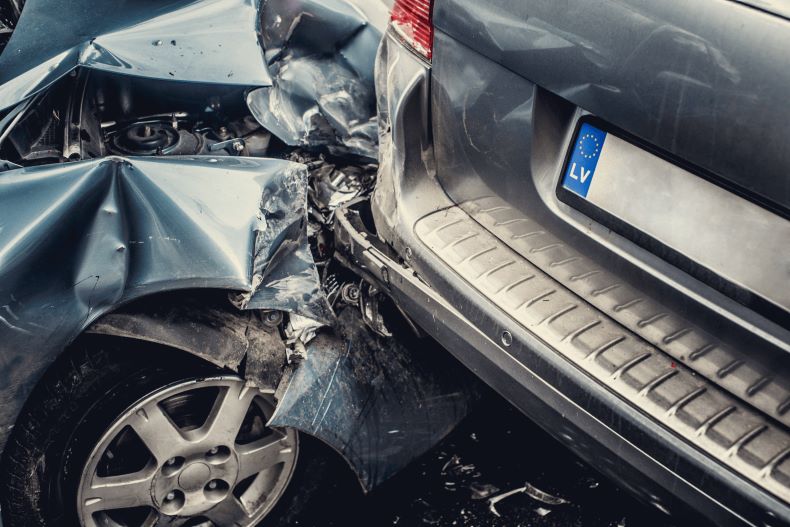
Getting rear-ended in any car accident can be a frightening experience, but when it happens in a company vehicle, it can bring about a unique set of legal and logistical challenges. In the fast-paced world of Nevada, where car accidents are sadly common, you must know how to handle such situations effectively. This article will guide you through the essential steps to take if you find yourself rear-ended in a company vehicle in the Silver State, providing legal insights and actions to protect your interests.
Rear-End Collisions and Car Accidents
Rear-end collisions are a prevalent and often preventable type of car accident. Understanding the common causes and potential ramifications is crucial for all motorists. A rear-end collision occurs when one vehicle crashes into the back of the rear driver. These incidents can result in a wide range of consequences, from minor property damage to severe injuries.
By prioritizing safe driving practices, maintaining awareness, and adhering to traffic regulations, drivers can play a significant role in reducing the frequency and severity of rear-end collisions on our roads.
What to Do After an Accident with a Company Car?
In the unfortunate event of a rear-end accident in a company vehicle in Nevada, you should follow these crucial steps:
Ensure Safety:
First, check your injuries and ensure the safety of all involved parties. If anyone is injured, seek medical care immediately.
Contact the Police:
One of the most important things in case of an accident is to do is to call the police and report the accident. A police report is crucial for documenting the incident and determining fault.
Exchange Information:
Exchange information with the other driver(s) involved in the accident. Obtain their contact and insurance details.
Notify Your Employer:
If you are the employee operating the company vehicle, notify your employer as soon as possible. Provide them with accurate details of the accident, including any injuries sustained. This allows the company to initiate the necessary procedures and report the incident to their insurance provider.
Document the Scene:
Take photographs of the accident scene, including vehicle damage, road conditions, and any skid marks. This documentation will be valuable later. This documentation can be invaluable in establishing a timeline of repairs, identifying patterns of negligence, and ultimately determining liability. Additionally, prompt action in securing the vehicle for a comprehensive examination can significantly impact the strength of the case.
Seek Medical Attention:
Most people avoid going to a doctor if they feel fine. However, it’s advisable to seek medical attention to ensure there are no hidden injuries. Medical bills and records will be essential for your claim so don’t forget to keep all records.
Consult a Car Accident Lawyer:
Consider seeking legal representation from a car accident lawyer who specializes in personal injury cases. They can guide you through the legal process and help ensure you receive a full and fair settlement.

Who Is Liable for an Accident Involving a Company Car?
Liability for an accident involving a company car can vary depending on the specific circumstances and the laws of the jurisdiction in which the accident occurred. Following are some key factors that help you determine liability in such cases:
Driver’s Actions:
If the driver of the company car was negligent, reckless, or at fault in causing the accident, they may be held personally liable for the damages. This liability could include situations where the driver was speeding, driving under the influence, texting while driving, or engaging in other unsafe behaviors.
Employer’s Vicarious Liability:
Employers can be held vicariously liable for their employee’s actions performed within the scope of employment. This legal concept, known as “vicarious liability,” means that if the accident occurred during work-related tasks or errands in the company car, the employer may be held responsible for the damages, as the employee’s actions are considered an extension of the employer’s responsibilities.
Third-Party Liability:
If the accident was caused by the negligence or recklessness of a third party, such as another driver, that third party would be liable for the damages. In this scenario, neither the driver of the company car nor the employer would be at fault.
Vehicle Defects:
If the accident was caused by a mechanical defect or malfunction in the company car, liability may fall on the manufacturer or the party responsible for maintaining the vehicle, such as a third-party repair shop.
Comparative Negligence:
In jurisdictions like Nevada, comparative negligence divides liability among parties based on their respective fault levels. Each party is accountable for damages proportionate to their negligence degree.
Common Causes of Rear-End Collisions in Company Vehicles
Rear-end car accidents can happen for various reasons, certain factors commonly contribute to such incidents in company vehicles:
Distracted Driving: Distractions from phones, in-vehicle technology, or other sources can lead you to rear-end crashes. If your employer is found to be negligent in enforcing distracted driving policies, they may be held accountable.
Defective Brakes or Mechanical Defects: If the accident is caused by a mechanical issue, such as defective brakes, the responsibility may fall on the employer for not properly maintaining the company vehicle.
Drunk Driving or Other Personal Reasons: If the accident occurs while you are under the influence of alcohol or for personal reasons unrelated to work, it may not be covered by your employer’s insurance, as it falls outside the scope of employment.
What Damage Can a Rear-End Collision Cause?
A rear-end collision can cause various damages, including:
Vehicle Damage: Both vehicles involved may suffer damage, ranging from minor dents to severe structural issues.
Injuries: You can experience the following car accident injuries:
whiplash
concussions
back and neck injuries
broken bones
Cuts and Bruises
and other physical harm.
Emotional Distress: The accident can lead you to stress, anxiety, and emotional trauma.
Financial Impact: This includes lost wages due to missed work and medical expenses for treatment and recovery.
Pain and Suffering: Compensation may be sought for physical and emotional pain.
Reduced Quality of Life: Injuries may limit daily activities and hobbies.
Long-Term Disabilities: Some injuries can lead to lasting or permanent disabilities.
Fatalities: Tragically, rear-end collisions can result in fatalities, affecting families emotionally and financially.
Insurance Coverage After a Company Car Accident
Insurance coverage following a company car accident can be complex and may involve multiple parties. Here is an overview of the insurance coverage that typically applies after a company car accident:
Employer’s Commercial Auto Insurance:
Typically, employers with company vehicles carry commercial auto insurance. It covers vehicles and drivers during work-related use. If the employee is at fault, this insurance covers damages to both their vehicle and the other party’s, as well as any resulting injuries.
Employee’s Personal Auto Insurance:
In some cases, employees may be required to have personal auto insurance that extends coverage to the company vehicle. If the employer’s commercial auto insurance is insufficient to cover the damages or injuries, the employee’s personal insurance company might come into play to provide additional coverage.
Third-Party Insurance:
If the accident was caused by another driver, that driver’s auto insurance is responsible for covering damages and injuries. In this situation, the company’s commercial auto insurance is not typically involved, unless there is a dispute about liability or if the at-fault driver is uninsured or underinsured.
Workers’ Compensation Insurance:
In cases of work-related accidents, injured employees may be eligible for workers’ compensation benefits, covering medical expenses, lost wages, and rehabilitation.
Why a Car Accident Lawyer Is Essential
Navigating the legal complexities of rear-end collisions in company vehicles can become complicated quickly. A car accident lawyer acts as a staunch advocate for your rights, ensuring that you are not taken advantage of during negotiations or legal proceedings. An experienced car accident lawyer will help you determine liability, gather evidence, negotiate with insurance companies, and represent your interests. They will work to secure fair compensation for your injuries, medical expenses, lost wages, and property damage.

Hire a Proficient Car Accident Attorney at BLG
Getting rear-ended in a company vehicle in Nevada is a stressful and often complicated experience. However, understanding your rights, your employer’s responsibilities, and the legal framework for such accidents is crucial. By following the right steps and seeking legal representation when necessary, you can ensure that you receive the compensation you deserve and protect your interests in the aftermath of a rear-end collision.
Remember, the law is on your side, and a skilled legal team can help you navigate the complexities and ensure a fair settlement in the Las Vegas area and beyond.
Building a robust case requires a comprehensive investigation and gathering of evidence. A car accident lawyer has the resources and experience to conduct a thorough examination of the accident scene, collect witness statements, analyze medical records, and gather other crucial evidence to strengthen your case.
If you have been involved in a rear-end accident in a company vehicle, don’t hesitate to reach out for a free consultation with a Nevada personal injury attorney from a reputable law firm to discuss your case and take the first steps toward justice and recovery. Your well-being is of the utmost importance, and legal experts are here to support you during this challenging time.
When you’ve been rear-ended in a company vehicle, navigating the legal complexities is crucial. Don’t do it alone; hire a proficient car accident attorney at BLG today. We’re here to protect your rights, secure fair compensation, and guide you through the process.
Contact us now for a free consultation and take the first step towards justice and recovery.





